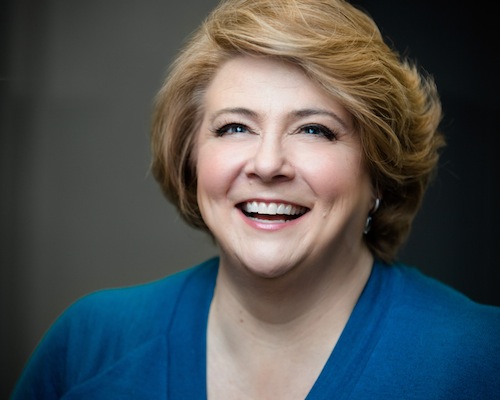Elizabeth Bishop lifts Apollo Orchestra program of Mozart and Mahler

Mezzo-soprano Elizabeth Bishop performed with the Apollo Orchestra Friday night at the United Church.
The Apollo Orchestra, founded in 2010, brought one of its free concerts to downtown Washington on Friday night. This was the ensemble’s first performance in the United Church, a historic German-language church in Foggy Bottom. The audience filled the relatively small worship space, including many families with young children, a sight that is always encouraging in this era of classical music’s aging base. The family foundation of real estate developer Robert B. Downing, who serves as Apollo Orchestra’s president, makes the group’s concerts possible.
Assistant conductor Jeffry Newberger led a pert, crisply articulated rendition of Mozart’s Symphony No. 38, nicknamed “Prague” for the city where it was premiered. The chamber-sized group, with about two dozen string players, produced a volume that easily filled the church. The first movement was best in the Allegro section, especially in the daring contrapuntal excitement of the development section.
Newberger helped the ensemble shape a graceful second movement, the tempo just slow enough for an elegant pacing. Many of the orchestra’s members are recent music graduates, and the playing felt earnest if not always assured. Wrong notes and intonation issues crept in here and there in the string sections, and there was what sounded like an early flute entrance in the second movement. The fast tempo of the finale caught some of the musicians flat-footed, especially in the second violins, and a tendency to rush further unsettled the ensemble in this movement.
Mezzo-soprano Elizabeth Bishop, cherished locally for her roles with Washington National Opera, reigned over the evening in her exquisite solos in Mahler’s symphonic song cycle Das Lied von der Erde. Her voice boasted a complex bouquet of tonal colors, from controlled tenderness to blazing force, a sound refined throughout its entire rounded compass. Her German diction, in these heady translations of Chinese poetry, was impeccable.
Bishop went from flirty warmth in “Von der Schönheit,” thrilling with the excitement of the handsome youths and their frenzied horses, to a delectable bleakness in the extended final song, “Der Abschied.” That climactic song featured longing woodwind solos, especially nice in the flute’s mimicking of the Chinese bamboo flute. Unfortunately the harp and many of the strings had gone badly out of tune by the end of this extended cycle, no doubt partly due to the evening’s unexpected warmth.
Tenor Clay Hilley not only filled in at the last moment for his indisposed colleague, Barry Banks, but he did so with heroic vocal strength. Mahler’s writing in the more boisterous tenor songs is often thankless, but Hilley delivered them with panache, especially in the ringing high notes at the ends of stanzas in “Der Trunkene im Frühling.” More than one rehearsal would have surely helped in coordination with the orchestra, but music director Stephen Czarkowski was able to keep the performance on track.
A reduced orchestration of Mahler’s score, by Glen Cortese, meant that the orchestra was only slightly larger than for the Mozart, but the sounds it produced were still too large for the modest venue. When the piccolo squealed and the brass bellowed, not to mention the ear-bending volume of the singers, the sond was overwhelming from a set in the middle part of the church. Moving to the last row of the building was more tolerable, but this was not music on the scale of the acoustic even then, for all of its polish.
The Apollo Orchestra next appears at Chevy Chase Presbyterian Church 4 p.m. January 28, 2018, in opera scenes with singers from Washington National Opera’s Domingo-Cafritz Young Artist Program. apolloorchestra.com

Posted Nov 05, 2017 at 5:56 am by Rev. W. T. Federici
As Senior Pastor of the United Church, I want to note that we are not only “a German language church”. We offer services in English every week at 11am, and in German on the 1st and 3nd Sundays at 9:30am.